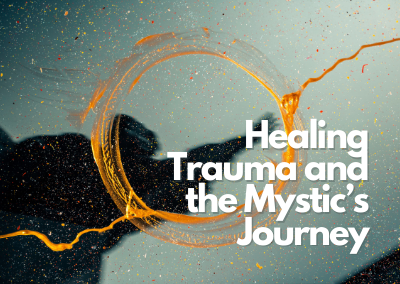
After ten years as a trauma therapist, I’ve found myself becoming quite fatigued with the literature on trauma; after a while, it’s all became repetitive and restrictive. What I have found out there feels incomplete, like it unwittingly limits us survivors in our healing journey. Some of the most powerful moments of healing I’ve had and facilitated often involve more mystical experiences, which the field of psychology seldom touches on. Yet, these are some of the most transformative experiences. Why do most trauma books and trainings neglect this aspect or glaze over it?
Remember the Soul in Healing
I found myself searching for something more profound, exploring trauma from a Spiritual lens. When I speak of Spirituality, I frame it as anything that brings us closer to ourselves and thus the world. The etymology of the word psyche is “invisible animating entity which occupies and directs the physical body; the soul, mind, and spirit “1.
Put more simplistically, psyche translates to soul and psychotherapy to soul healing, yet any mention of the soul has been removed from academic literature about trauma. This demonstrates the problematic colonial prioritization of intellect over the body and thus the soul. In my search for trauma literature that spoke directly to the spiritual components of trauma, I picked up a book called Trauma and Beyond; the Mystery of Transformation by Ursula Wirtz. It is breathing life back into my passion for learning about healing trauma.
She draws a correlation between the three stages of the mystics path and the process of trauma therapy; via purgative – purification, via illiminativa – insight, and via unitive – union.
Purification, insight, and union
Purification in the sense that through trauma therapy, we burn down the erroneous meaning we had to make during our lived experiences that led to trauma. In burning through these faulty beliefs and behaviours, we gain insight into who we truly are and reunite with the essence of our being.
Before living with trauma, we had a particular understanding of the world and how it worked. Our lived experiences that led to trauma shattered this view and caused us to rewrite our understanding of how the world worked and our place in it.
Transformation Beyond Trauma
Transformation beyond trauma, as Wirtz suggests, requires us to break from our worldview yet again and rewrite our understanding of it and our place in it with conscious intention from a place of care and sovereignty. In this way, we are agents for change, and in dismantling our worldview, through therapy, we unfold into possibilities.
How does the concept of the mystic’s path and rewriting our world view to heal trauma impact you? What possibilities does it allow you to imagine?
It further validates my belief that embodying our imagination is a path to profound and long-lasting changes. It permits me to use imagery, art, dance, movement, and ceremony, all Spiritual practices, as conduits to healing.
